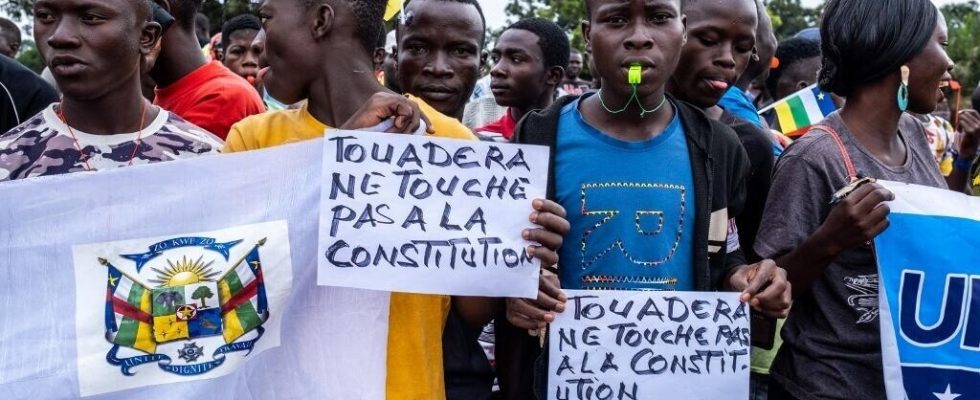As President Macky Sall prepares to reveal whether he will try for the third presidential term in February 2024, Senegal holds its breath after the violent demonstrations in June 2023. A climate of tension that crosses many States African countries, usually preceded by a change in the Constitution.
“ It is unfortunate that the Constitution, which should be the sacred text of the citizens, is reduced to an electoral law “. lamented in 2020 the Ivorian historian Moritié Camara. A few weeks earlier, on the eve of the national holiday of August 7, its president Alassane Ouattara took advantage of the traditional televised address to announce his candidacy for a third term. “ I had informed the whole nation of my desire not to apply and to hand over to a new generation. I had begun to organize my departure, plan my life after the presidency, relaunch the activities of my foundation “, had declared the outgoing president. But, heart complications having brutally taken away his officially designated heir apparent, former Prime Minister Amadou Gon Coulibaly, the Ivorian head of state went back on his word while answering ” in favor of the appeal of (his) fellow citizens (…) in the best interests of the nation “. The decision had caused a wave of panic among the population, greatly traumatized by the civil war of 2010-2011 and its 3,000 deaths according to the UN, and which already opposed Alassane Ouattara to his predecessor Laurent Gbagbo.
It is on the basis of a new Constitution adopted in 2016 that the Ivorian president justified his right to run again for the supreme office, his supporters even going so far as to refute the expression “ third term », preferring him « first term of the new Republic “. The announcement very quickly led to violence in Abidjan and across the country, causing the death of a hundred people and a serious political crisis. If a political dialogue made it possible to reduce the tension, it did not clearly decide on the question that a possible future reform could raise: does the modification or the revision of the fundamental law reset the counter of the number of presidential mandates to zero ? The answers, much more political than legal, are opposed according to the side on which one stands.
In Guinea and the Central African Republic, an outdated Constitution
Guaranteeing the peace and stability of the country, the supranational interest, the call of the sovereign people… The arguments put forward by the heads of state to touch the fundamental law are generally the same. In Guinea, President Alpha Condé justified the adoption of the new text, arguing that the old one in force had been drafted in 2011 by a transitional assembly, and not by elected deputies: “ Guinea needs a new Constitution, because the current one is not good, everyone knows that. We were forced to make political agreements that violated the Constitution “, he had declared.
The former head of state also claimed to be content to respond to the demands of the people who mobilized for change. Mobilizations yet very little followed, compared to those of the camp opposed to a constitutional amendment. The ensuing crisis caused the death of dozens of protesters and hundreds of people in prison, before the military coup of September 2021.
Like his former counterpart, as he nears the end of his second term, Central African President Faustin-Archange Touadéra also pointed to the obsolete nature of the 2016 Constitution: “ Since its promulgation, political currents as well as a majority of our populations have found it insufficient, in particular in that it does not propose appropriate solutions to the causes of the recurrent military-political conflicts that the country is experiencing. “. Rarely, the Constitutional Court had opposed any reform of the text. The standoff with power finally got the better of Danièle Darlan, President of the Court retired by presidential decree. The referendum is finally scheduled for July 30, 2023.
Azali Assoumani in the Comoros in 2018, Denis Sassou Nguesso in the Congo in 2015, Pierre Nkurunziza in Burundi in 2015… Far from being exhaustive, this list indicates the Heads of State who have benefited from a constitutional change ensuring country orders. In 2015, the revision of the Constitution in Rwanda potentially authorizes President Paul Kagame to remain in office until… 2034! Each revision and modification served to circumvent the lock of the two authorized mandates. When they have not simply blown it up, like Cameroon led for more than forty years by Paul Biya.
attempts and failures
But not all presidents manage to get a new fundamental text passed. In some countries, the attempt has even had the opposite effect. In 2014, Burkinabè head of state Blaise Compaoré, 27 years of reign on the clock, wanted to touch the Constitution. Released by his own army, he was forced into exile after only two days of popular revolt.
In DR Congo, the continued power of Joseph Kabila after the end of his second term at the end of 2016 provoked a political crisis punctuated by violence. After three postponements of the presidential election, the opponent Félix Tshisekedi succeeded him in 2019.
Of the “ good students “, Nevertheless
There are also countries where the limitation of the number of mandates has entered into the political culture. These are the cases of Nigeria, Kenya, Benin, and Niger, among others.
Changing the basic law to stay in power is nothing new in Africa, but the practice has been normalizing across the continent for more than a decade. The modification or revision of the Constitution always raises the same question: does it reset the counter of the number of presidential terms to zero? The answers are much more political than legal and differ entirely depending on which camp the arguments come from.
The only certainty common to all these states: reworking the fundamental law causes more tension than appeasement when the presidential seat is weighed.
